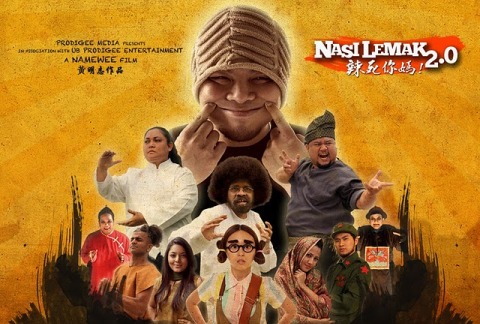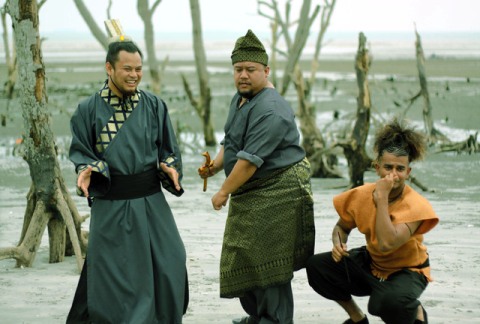Nasi lemak may be the dish to unite Malaysia. Well, that’s what controversial rapper-cum-filmmaker Namewee is aiming for.
The ethnic Chinese rapper accused of stirring Malaysian racial tensions has brought his social commentary to cinemas with a food-themed comedy celebrating the country’s mixed cultural recipe.
The comedy Nasi Lemak 2.0, named after the national rice dish and which opened last week, takes an unflinching but ultimately fond look at many of the racial stereotypes that Muslim-majority Malaysia’s various ethnic groups aim at each other.
I love nasi lemak and I respect Namewee. So when Nasi Lemak 2.0 hit the local cinemas, I could not resist watching it. Now that I have watched the movie, I think it is a commendable debut effort by Namewee. No, it’s not gonna win any awards. Though the movie is quite watchable, it somehow did not quite live up to my expectations. I guess that shows how highly I think of Namewee as I have expected him to come up with a masterpiece. Namewee managed to throw some punches in his daring exploration of a tide of racial distrust that has raised concerns among many Malaysians. I think he has a great future in movie-making once he has garnered sufficient experience and exposure.
With its song-and-dance numbers, martial arts routines, jokes drawing on current events and an impressive cast of local stars such as Adibah Noor, Dato’ David Arumugam, Karen Kong, Afdlin Shauki, Kenny & Chee, Reshmonu, Dennis Lau, Nur Fathia, Nadine Ann Thomas, Pete Teo, Ho Yuhang, Dian Sharlin and Felixia Yeap , Nasi Lemak 2.0 has received good reviews and audience has responded enthusiastically to it, enabling it to rake in more than 1.5 million ringgit in box office receipts in its first four days in cinemas.
Nasi Lemak 2.0. is a multi-cultural based movie about an arrogant chef played by Wee who meets people from diverse racial backgrounds and gradually learns the true meaning of unity and non-discrimination while on a quest to find the best Nasi Lemak recipe.
Initially ridiculing Malay food, he finds however that he needs the help of people from all races – including a Malay man with four wives and Indians who dance Bollywood-style – to create a delicious new version of nasi lemak after he was roped into a cooking competition.
In one scene, an ethnic Chinese student complains of difficulty getting into college, a reference to quota policies and other privileges favouring the dominant Malay ethnic group.
Another scene shows a Malay character brandishing a kris, a throwback to the Hishammuddin Hussein’s kris incident that has lingered in the minds of most Malaysians.
Remember Datuk V.K Lingam’s infamous statement “It looks like me and it sounds like me” during the Royal Commission of Inquiry probing the controversial Lingam video-clip? That line has made its way into one scene in the movie.
“My message is that the system in Malaysia is unequal … But when we live together, we eat together, there is no racism,” said Wee.
More than half of Malaysia’s 28 million population are Malay Muslims, alongside sizeable Chinese, Indian and indigenous minorities.
Overt racial and religious antagonism has been largely avoided since deadly race riots in 1969.
Namewee, real name Wee Chee Meng, first stirred the hornet’s nest in 2007 with his controversial rendition of the national anthem Negara-ku in his rap song ‘I Love My Country Negarakuku’ in 2007.
In 2009, authorities threatened sedition charges over another of Wee’s song, Nah – based on a real incident – which lashes out a Malay school headmistress who makes racist slurs against her ethnic Chinese and Indian students.
Wee insists he is a patriotic Malaysian and that his art is meant to provoke a positive discussion leading to fairness and social harmony.
With potentially divisive snap elections expected to be called soon, Prime Minister Najib Razak has pushed his “1Malaysia” campaign promoting ethnic unity, and Wee said the film was meant to support that.
However, he adds: “I want to show the real Malaysia, how we live together. For 1Malaysia to work we have to be treated equally.”
“Nasi Lemak 2.0 is my gift to Malaysia in conjunction with the National Day celebrations,” Namewee told a press conference.
Nasi Lemak 2.0 was made on a shoestring budget of less than 1 million ringgit. Due to the controversies surrounding Namewee last September, the initial plan to complete Nasi Lemak 2.0 in 2010 was derailed when the sponsors and private investors pulled out from the project, spooked by the threat of sedition charges. None was ever filed. Because of budget constraints, the movie was shot with a DLSR!
Luckily for Namewee, the Minister from the Prime Minister’s Office, Dato Seri Nazri Aziz officially announced Namewee’s innocence in Parliament at the end of last year after viewing his proposal and the Nasi Lemak 2.0 movie trailer. Shooting of the movie was thus revived this year.
Despite the film’s positive message, Wee remains outspoken.
He said Nasi Lemak 2.0 was aimed at internet-savvy Malaysian youngsters fed up with official calls for unity by the Malay-dominated government that has been in power for decades.
“Our government always treats the people who are against them or disagree with them as criminals,” he added, referring to the threatened sedition charges.
“Nasi Lemak 2.0 may not be perfect, but it has its moments,” leading English daily The Star said in a review. “It’s a Malaysian movie, yes, but it is out to make us take a good hard look at ourselves… and laugh.”
The movie is mostly in Mandarin and Cantonese with a smattering of other Chinese dialects, Bahasa Malaysia, English and Tamil.
Because Namewee uses vulgar words excessively in his songs, people tend to think of him as an uncouth person. But the truth is far removed from reality. He’s in fact a very polite young man and is very encouraging of aspiring artists and authors.
Namewee is also a patriot who wants nothing but a better Malaysia for the future generation. He mentioned that as an artist, he feels that the only way he can reach out to the public about his visions is through his songs.
Namewee fears that his feature film ‘Nasi Lemak 2.0’ may be banned because of a recent demonstration against it in Perak.
“This movie received approval before shooting, and another approval before screening, I hope the authorities can respect their own decision, as well as my work,” he said.
The film, now screening in major cinemas nationwide, was reported to have received backlash from groups claiming it has bad influence on young people.
Protesting outside a cinema in Ipoh, a group calling themselves Pertubuhan Gagasan Rakyat Didahulukan Perak had demanded that the government consider barring its further screening.
The NGO’s president Faizal Afendi Hashim said protests will continue until the ban is in place.
Yesterday, Home Minister Hishammuddin Hussein said that those who are unhappy with the film are welcome to lodge complaints.
Nasi Lemak 2.0 producer Fred Chong, however, urged Malaysians to understand the true meaning of the film before passing judgment, claiming that the movie actually celebrates the diversity of Malaysia and is line with the 1Malaysia concept.
Wee Meng Chee acknowledges the political overtones of Nasi Lemak 2.0 but says, ‘My message is that the system in Malaysia is unequal … But when we live together, we eat together, there is no racism.’
If you haven’t watched the movie, catch the movie trailer below:
 CY@CY Says Welcome to my dreamscape. Where a Lim is also a Ling.
CY@CY Says Welcome to my dreamscape. Where a Lim is also a Ling.








